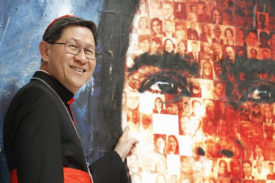By Inés San Martín

ROME (Crux) – Diplomats around the world will tell you that despite its flaws, the Catholic Church is a remarkable intelligence network, one with personnel always front and center in countries marred by man-made or natural crises.
Perhaps the leading case in point is Caritas Internationalis, the umbrella organization that serves as a federation for more than 160 national Catholic charities all over the world. From Sri Lanka and Ukraine to Nicaragua and Haiti, Caritas is always on the front lines.
Some 450 delegates from 150 countries gathered in Rome to participate in the May 21-25 XXI Caritas general assembly. The crowd was as diverse as the needs they help meet, with cardinals, bishops and laypeople cheek-by-jowl sharing best practices, discussing the future and raising awareness of the situation in their countries.
Janeth Marquez, a laywoman who’s the director of Caritas Venezuela, told Crux on May 23 that the impact of the country’s economic downfall and the ongoing crisis for the poorest among the poor is “devastating.”
“We used to see children with malnutrition, and we were able to help some 28,000 of them in the past two years, pre- venting them becoming chronically malnourished,” she said. “Yet today, almost 40 percent of the children who arrive to our offices are already chronically malnourished. This means that they will need to be cared for their whole lives, their cognitive ability permanently affected.”
According to Marquez, the situation in Venezuela is “at the limit.” Both Caritas and the Catholic Church at large report that the situation is getting worse, with shortages of food, medicines, public servic- es – the entire country was without electricity for days on end earlier this year – and gasoline.
In addition, she said, “desperation is once again getting the best of us,” with the “rush of hope” many in Venezuela felt ear- lier this year with the rise of opposition leader Juan Guaido quickly vanishing.
“We have almost four million Venezuelans who fled the country in recent years, and we’re seeing that migration start again,” she said.
According to an article recently published in The New York Times, Venezuela’s economy has experienced the worst down- fall the world has seen outside a war zone in decades. Also present in the assembly were representatives from Syria, a country whose economy has also suffered immensely in recent years because of war.
Riad Sargi, the executive director of Caritas Syria, hails from Damascus. Speaking with Crux, he said that the situation in his country has improved from where it was four years ago, during the last plenary session, but things continue to “be hot” in some regions, with pockets within the country where the armed conflict is still ongoing.
In this Middle Eastern country, Caritas is focused mostly on providing emergency aid, from food baskets and care for the elderly who many times were left behind by families fleeing, to providing medical aid and education for children.
Sargi also said that even though ISIS, the terrorist Islamic organization that perpetrated genocide against Christians, Yazidis and other minorities in Syria and Iraq no longer holds any territory, Christians are still in danger.
“People around the world should still be praying for the survival of Christianity in the Middle East, as we’re still threatened,” he said.
Not all of the delegates on hand come from countries experiencing deep crisis. For instance, Catholic Relief Service, the official overseas development arm of the U.S. Bishops, was represented by its president and CEO Sean Callahan.
Speaking with Crux, Callahan said he hopes that all the different regions “continue to come closer together and that we strive more for our goal of strengthening each other so that we can provide better services out in the field.”
CRS is finalizing a new strategy, that they’ve dubbed “Humble but Bold,” that aims to make some “big changes” out in the world, like ending malaria in West Africa by 2030, something they’re working with the Global Fund to achieve.
A key area for CRS, he said, is strengthening and sharing capacity with partners, building their capacity and changing the way Catholic charities around the world do things.
“Basically, our strategy is to support the local church. We’re invited by the local church and then the government, so we’re not the ‘big bad United States coming in and imposing ideas,’” he said.
“We help water the seed of greatness in a lot of these local Caritas, maintain these connections, and help with new technology or in any way we can. We learn from them, they hopefully learn from us.”
